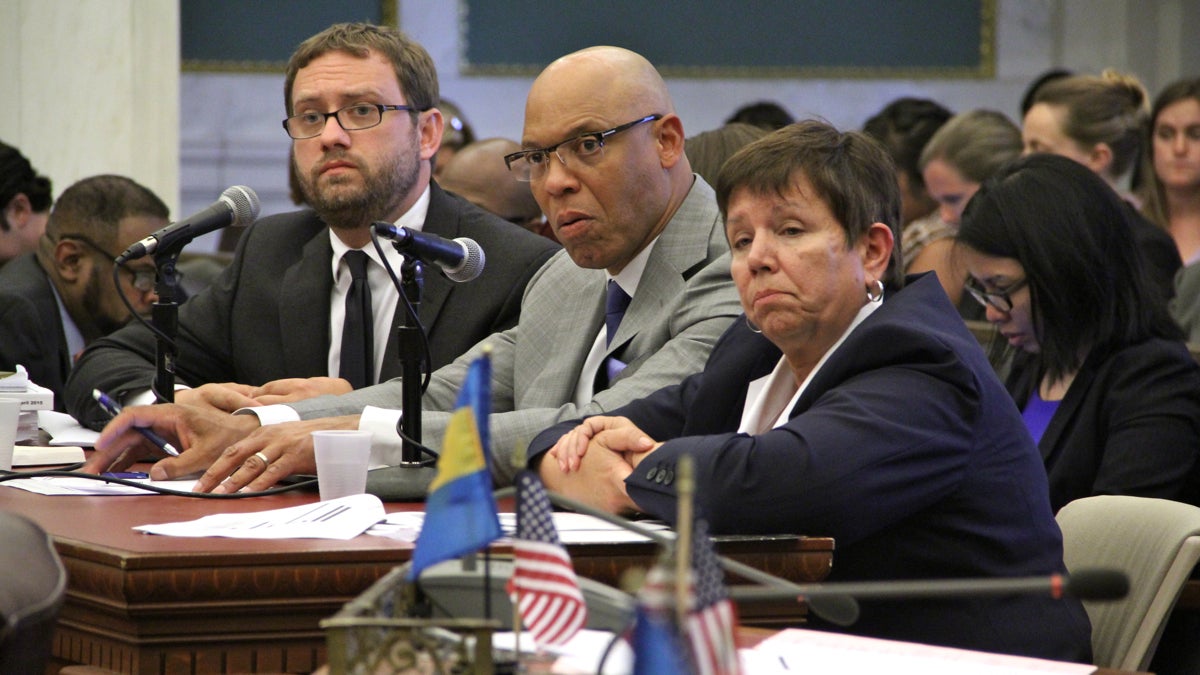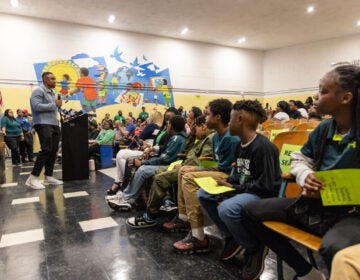Philadelphia City Council talks budgets, penmanship with school district

Philadelphia schools Superintendent William Hite (center), accompanied by district Chief Financial Officer Matthew Stanski and SRC Chairwoman Marjorie Neff, answer questions from City Council members during a budget hearing at City Hall. (Emma Lee/WHYY)
It’s budget season, and the School District of Philadelphia is making the rounds to seek money for the coming school year.
District officials appeared before City Council Tuesday to ask for recurring funds, to the tune of about $100 million a year, to help them achieve long-term strategic plans. In response, City Council asked for more information about how the district had spent past budget contributions, as well grilling the educators about penmanship.
With no additional funding from either the city or state, the district faces an $85 million budget deficit for the next school year. In order to make good on the promises in Action Plan 3.0, the district’s strategic lodestar, it’s requesting $300 million in combined additional, annual funding from Philadelphia and the state.
As several pointed out, the Philadelphia has authorized a few last-minute funding infusions to make up for shortfalls in state funds.
“Every year, the city steps up to the plate,” said Council President Darrell Clarke. “The state doesn’t. That’s not your fault,” he said, referring to district officials.
But, he said, under Gov. Tom Wolf’s watch, it seems more likely the district would get additional funds from the state.
Wolf’s proposed budget would give the district $159 million in additional, recurring funds. Mayor Michael Nutter’s proposed property tax increase would throw in another $105 million. Wolf’s plan must pass muster with the state Legislature and its Republican majority. And the idea of a property tax increase has not received much support from Clarke or the rest of City Council.
Members of the School Reform Commission acknowledged that city’s contributions, totalling $327 million, to the school district over the past three years. But, they said, because of the scale of the district’s need and its mandated costs, that funding is not enough to cover costs, much less to put teachers back in classrooms.
“Over that time frame, we have seen our fixed costs go up exponentially,” said Matt Stanski, the district’s CFO. Philadelphia’s contributions have gone toward paying for those fixed costs — such as pensions, debt service and charter reimbursement — while the district has had to cut back on staff, teaching areas and extracurriculars.
“We cannot and should not ask our schools to give up anything more,” said School Reform Commission Chairwoman Marjorie Neff. “To put it simply, there is nothing left to cut.”
Clarke shared with City Council a letter sent to the district dated May 20, requesting a full accounting of how it had spent the $327 million. The official response, according to Clarke, was “basically nothing.”
‘Trying to navigate with a broken mechanism’
Over the course of nearly three hours, City Council and various members of the school district and School Reform Commission went back and forth over policy and budget questions — and cursive.
In addition to Clarke’s call for a thorough accounting of past expenditures, council members asked for information about special education funding, how much money the Department of Human Services spends providing services in the schools, how building repairs are managed and whether the SRC has a succession plan, to name only a few concerns.
At several points, Clarke asked members of the SRC and Hite if they would allow the city to attach strings to any cash they might give, for example, requiring that the district not outsource new hires but instead hire from within the teachers union. Another idea was to give money to partners working within schools, rather than to the school district itself.
“I’m not for anything that takes money from us to give to some other entity,” said Hite.
Council so far has asked no questions about charter funding; one question only from @ed_neilson on status of PFT contract. #phled
— Dale Mezzacappa (@dalemezz) May 26, 2015
In her first comment, Councilwoman Jannie Blackwell touched on the apparently hot topic of cursive. “We introduced a resolution about this whole issue of cursive writing. It’s kind of been big around the country,” said Blackwell.
“We certainly are hoping that the school district may not make it optional but may make it a requirement for our students,” she said.
A lone enthusiast clapped from the chamber’s gallery.
Councilwoman Marian Tasco also took up the cause, sharing an anecdote about a witness in the Trayvon Martin case who was unable to participate because she couldn’t read cursive.
“Thinking about the whole society that we live in,” said Tasco, “I do think cursive writing is very, very important.”
In addition, Councilwoman Blondell Reynolds Brown asked pointed questions about how cursive is taught.
“Are children graded on their cursive writing?” she said.
The answer, according to the district’s Chief Academic Officer Donyall Dickey, is that while cursive is “embedded” in early learning curriculum, it is not currently tested in the same way that, say, math skills are.
Council members asked district officials to figure out a way to make cursive a part of its elementary school requirements and report back next year.
Sidebars on cursive curriculum aside, there were a few points on which the district and city officials seemed to agree. One was the need for a fair funding formula at the state level.
“We’re struggling through trying to navigate with a broken mechanism,” said Hite.
Public comment for the school districts budget will be heard Wednesday, and the district plans to adopt a budget on June 30.
WHYY is your source for fact-based, in-depth journalism and information. As a nonprofit organization, we rely on financial support from readers like you. Please give today.




